how to talk to a narcissist
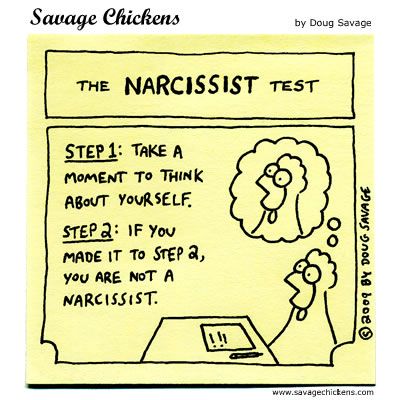 How To Win With A Narcissist: 5 Secrets Backed By Research - Barking Up The Wrong Tree
How To Win With A Narcissist: 5 Secrets Backed By Research - Barking Up The Wrong TreeMental Health Personal GrowthRelations Family LifeNeed help? Recently diagnosed? Talk to someoneCurrent So you're not a "10" anyway. But you're probably quite spectacular somehow, and definitely good enough in most areas of life. If there ever was a time to stop beating yourself up as a human being, it is now. Recent newsEssential ReadsTrending TopicsSearch Find a therapist Get helpMembers Get help Mental Health Personal GrowthRelations Family LifeNeed help? Recently diagnosed? Talk to someoneMagazine So you're not a "10" anyway. But you're probably quite spectacular somehow, and definitely good enough in most areas of life. If there ever was a time to stop beating yourself up as a human being, it is now. TodayNewsEssential ReadsTrending Topics Verified by Psychology Today13 Keys to Understand the Narcisist-Speak Discovering the hidden intention in the communication of narcissists. Published Mar 27, 2020 Narcissists tend to communicate differently than other people. His words are often used as tools or weapons. His language tends to disguise his true intention. This can make listening to the narcissists more difficult and less direct than communication with most people. Given that, learning to see the meaning and motivation behind the messages of the narcissists is crucial. The following are examples of the type of language narcissists they often use. Each example is followed by a translation that gives as much as possible, the intention and the underlying thought each sentence. These translations list what a person might say if they were telling the truth without adornment about their goals. Narcissists may or may not recognize their underlying motives, but they certainly do not want others to know them. "You are too sensitive" = Your feelings are a problem for me. I don't know what to do with them. I have no interest in having. I don't even know what empathy is, even if I want to receive it. If I, maybe you'll stop bothering me with your feelings. You're upset but don't blame me" = You're making me defensive. If I bother you, it's your fault that you've been upset, not mine. Never, I take the blame, or I admit I'm wrong. That would seem weak. How was your day? = I only ask how I preached to talk about me. I have a limited limit to listening to you. It's too hard to listen to others and I can only pretend interest for a short time. I'd rather talk than listen. Besides, I have an unlimited one to talk about myself. "You're wrong" = I have no idea whether what you're saying has any merit. However, if I can make you doubt yourself, you can be easier to influence and control. "I have never been safer in my life" = I believe what I say right now. I don't think of whether it's true or consistent with what I've said or done before, as long as I get what I want. The safer you act, the less likely you'll ask me. Being questioned feels like it's undermining me so I'll find ways to undermine you. Stop analyzing = What you're saying about me makes me uncomfortable. Introspection and uncertainty terrifies me. Tell me great things about me or don't talk to me at all. That's not what I said." = I may have said it but I don't like the way it makes me sound. My image is important. If I get stoned, they're likely to get confused or exhausted and yield. It's amazing how often I convince people that I'm right to speak with absolute certainty. "Of course I respect you" = I hope you create this because you will not see how little I really think about your needs or rights. I'm hungry for attention and respect. Whatever you do for me will probably never be enough but the longer I can keep you trying, the better for me. "I have heard this a million times before" = I will probably not listen this time either. If you complain about me or try to make me change, good luck. I am not aware of how my actions affect you." You are too demanding" = The fact that you have needs is annoying to me. You're supposed to meet my needs, not vice versa. "Stop being so selfish" = You're trying to steal my focus. Don't you dare! You can trust me" = You would be foolish to trust me but if I can make you believe this, I can keep using you. Besides, it makes me feel good to say it about myself. "This is what I am, take me or leave me" = I am not changing for you. Besides, if you ever leave me or you challenge me too much, I'll replace you in a beat and never look back. People are disposable to me. If you literally take the words of a narcissist, you'll probably end up confused or exhausted. The truth is that the narcissists live backwards. Narcissists are mortally afraid of feeling humiliated or being seen as imperfect, inferior, weak or "loser." His words reflect an endless shell game that tries to hide these insecurities. For example, to avoid feeling empty, narcissists act bigger than life. To avoid appearing wrong, they must be perfect or the best. To avoid being ignorant, you must be sure. To avoid illegitimate feeling, they act beyond reproach while delegitimizing or undermining others. Decoding the true meaning behind the words of a narcissist can cause, relief, sadness, freedom, and more. As the feminist Gloria Steinem said, "The truth will free you, but it can get angry first." Although we can have compassion for the narcissists and their wounds, we don't have to let the narcissists hurt us or take advantage of us. In his next conversation with a narcissist person, instead of asking "What did he mean?" you can look behind the curtain and realize, "Once again, he needs attention." Instead of asking yourself, "How could you say such a thing?" you can recognize "There you go again, inflate yourself for degrading others." Knowledge is power. The more you recognize the façades of the narcissists, the less confusing it becomes their behavior. Copyright © 2020 Dan Neuharth, Doctor, An earlier version of this post appeared in Facebook's image: fizkes/Shutterstock Until a couple of years ago, the word Narcissist was one that I rarely heard or used. However, here we are today and now I can clearly identify many people as such. It is true then, I suppose, that we all have narcissistic tendencies to some degree and I think it is necessary as a course of survival. However - and it is large, the number of people I have crossed paths lately showing very clear signs of severe narcissism, bordering the psychopathic behavior alarming encounter. I'm not sure if this is an indication of a mass social change or maybe I finally pulled my head off my comfortable HSP sand pipe. Either way, he's got me back to that pile. Thanks to my most recent interactions with a specific pair that played its narcissistic romantic drama using any and all available hand-in-hand as tools and tips for your own entertainment or as weapons against others during their 'battling' exhibitions. I've had enough. Not only have I reimbursed my head on the sand, but I also installed a complete system of mistrust that requires being tested totally wrong before you knock it down and let someone else in. It is almost the only reliable set limit that an HSP can use and remain safe and healthy. If this is where the world is, I don't want to be out there anyway. I just suck the energy trying to maneuver through a gas illumination, the narcissistic jungle. COVID and social distance could not have happened at a better time for me... and it has to be driving narcissists crazy. Anon, read "Generation Me" by Jean Twenge. She demonstrates the research shown in the 1960-2003 period, while the SAT has decreased slightly, the school donation (with primary demand) "A"-average in the GPA increased from 18% to 48%... When the directors use their power to fire the teachers to force them to do the director's school "looks good on paper" they are creating the next generation of narcissists focused on themselves. It's funny that you mention that particular book. Although I do not intend to read the whole way through it, while browsing for information to help me decipher what I have been experiencing with the random population lately, I have managed to land on several sites that cite passages from that same book. I cannot help but wonder if my generation appeared so strange to the previous generation, and so on. It makes me wonder (I'm sorry) about what we're evolving as a human race. I can't see a majority narcissistic society running on a level that's good for the group or the individual... and that's a recipe for total failure. The greatest advance in the control of narcissistic domination of all society has appeared here in PT - Pychology Today All-About-Narcissism an interview by Josh Miller by Arash Emamzadeh: "Emamzadeh: I have noticed that doctors, researchers and writers (including some writings for Psychology Today) do not always use the term "narcissist" consistently. I have read opinions about narcissism as different as the following (A vs B).A: Narcissists and psychopaths share a lot in common. It doesn't really suffer either, but both make people suffer around it. We have to learn to identify narcissists to protect ourselves from these dangerous and implacable individuals. B: The narcissists have fragile egos; their excess confidence is nothing but a mask. We need to have greater compassion for the narcissists because they are injured (although they do not admit it). The narcissists suffer like the rest of us. Which of these descriptions is closer to the truth? Miller: My thoughts are generally more consistent with option A in which narcissism and psychopathy are "near neighbor" constructions that overlap quite substantially. Interestingly, probably where they have been studied and how that affected the initial theories (narcissism: theories of psychodynamic theorists; psychopathy: forensic scenarios), there is little of "vulnerability" or the notion "mask" for psychopathy that is so consistent for narcissism in which we infer negative emotions (e.g. shame; depression; feelings of deficiency) that promote clinical opinions In my secular opinion (I need a sun-lounge) The narcissists are adult children who have gone mad at the preoperative stage of Piaget who were "born well" and will never accept, ever, corrections or learning because that would go through their impenetrable self-government, that God chose them to be "rightborn", not as priests, but as the gods of knowledge. Win/Lose is absolutely all for them, because any loss is possible proof that they were not "born well" in the first place. They absolutely do not believe that they are deficient and need posture to compensate for deficiency. They absolutely believe that all others are deficient, and they never want others' deficiency to obstruct their role as the god-saber. As a matter of humanity, I fought with A and B. The problem with B, I have learned, is impossible to offer compassion to a narcissist for his root suffering as they simply cannot recognize that it exists. I try to do it only labels you, in his opinion, as weak and able to be exploited. If there is an interesting side for this new narcissistic society, you are seeing the interactions between the narcissists as there are so many of them of a severe nature (at least here). Inevitably, however, there is also the resulting damage both direct and collateral that is simply terrifying. Taking a severe narcissist to face value is putting your life in your hands. Trying to decipher them, their thoughts, their real intentions and motivations is a great effort invested and still puts you in a proximity that is at best - uncomfortable. Like HSP, I'm desperately trying to learn to cope with these people, but it doesn't seem promising and frankly I don't even know where to start. For the time being and perhaps for the whole time, strict limits is my only choice... and that in itself is painful. Here are some more: "That child from there will grow to be an X ( insert type of work), I can say by the way they X (walk/sit/clothes their father chose for them etc.)" - narcissists insist that they know instantly 100% of a person after a small look at them, this is called "delgazation". Your uncle's father/Grandma/BFF will agree with me about your inadequacies! The narcissists not only think that God agrees with them, but also think that all who are not in the room also agree with them. They really think that the only people on earth who disagree with them are in the room with them right now. His vision of the world is very childish, very unconscious of things not directly in his small circle of attention. So they mock a figure outside the room that has its respect and imply that this respected figure will be absolutely in agreement with the narco about his inadequacies. "I need help with X" followed by the criticism of the moment for the same help you then provide. The narcos never want to "help." What they want is that another person fails in this task even worse than the narc failed in it. When the interlocutor succeeds almost instantly in the task, the reviews will explode! "I'm doing a PhD!" - yes, but how many years since they signed up? Have you defended him against the academic authorities? Narcs HATE defends academically, they literally can't handle it. Are you in your third or fourth supervisor? Much more likely, the narc is using the academic title to adorn its magical "knowledge given by God" with inappropriate authority. In my experience, every doctoral candidate who has more than 2 years of time is extremely unlikely to finish it, but it is very likely that he has family members and collaborators who know everything important that his doctorate is. Every narc I know you have an opinion on musical morality, as in "The classic is good, HipHop is bad" or in the other sense. They'll defend Wagner to the last. Fascinatingly, the vast majority of the #MeToo authors tried by the music court have come from the styles approved by the family, music that is very similar to the family style of "The Cosby Show". Classical music has proven to be a particularly dangerous place for low-powered individuals. Meanwhile, Heavy Metal that faced such criticism in the 80s/90s has gone through #MeToo squeaky-clean. The narcos love music festivals, where they can be chosen very easily as they constantly compare one band to another for "who is better," as if a band could run 100 meters faster than Usain Bolt. Hey Narcs! Music is art, not competition! It is literally impossible to "win" music, but the narcos insist that they know who won. Narcs will use the "unplanned child" ruse so that his/her children are unfavorably thanked for going above what the narc expected to do. "You were a mistake, dear, but we love you anyway, so you are not lucky!"About the authorDan Neuharth, Ph.D., MFT, is a marriage with a license and family therapist and bestseller author If you had controlling parents: How to make peace with your past and take your place in the world. Read Next Get the help you need from a therapist near you – a FREE Psychology Service Today. Cities: Recent issues

How to Talk to a Narcissist - 2nd Edition - Joan Jutta Lachkar - Rout

How to Talk to a Narcissist by Joan Lachkar

How to Deal with a Narcissist at Work: 4 Secrets for Talking so Your Narcissist Will Listen | Dan OConnor Training

5 signs you're talking to a narcissist – Narc Wise
Healing Our Addiction to the Narcissist: An Interview with Shahida Arabi - Mental Health News Radio Network

How To Talk To A Narcissist Without Going Insane | Narcissistic people, Going insane, Narcissist

How to Talk to a Narcissist to Avoid Being Used, Blamed and Manipulated - Learning Mind

He. Narcissist – Sassyrefusetosink
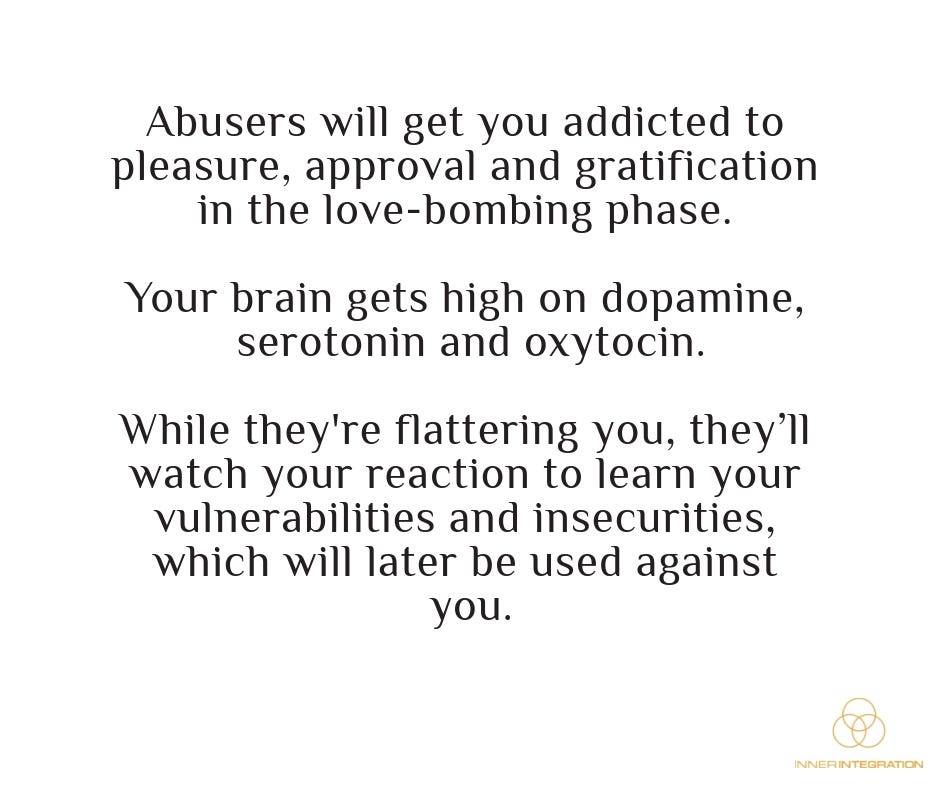
The Biggest Red Flag of the Narcissist | by Inner Integration | Medium

How To Talk To A Narcissist Without Going Insane – Family Court Corruption

Communication: How to Talk to A Narcissist - YouTube

How To Talk To A Narcissist Without Going Insane | Narcissist, Relationship with a narcissist, Narcissist and empath
Why do narcissists use word salad? - Quora
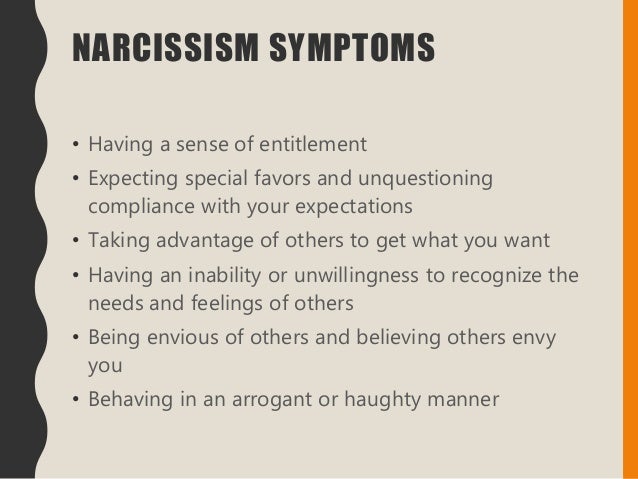
Narcissistic personality disorder

INFOGRAPHIC: 15 Tips for Handling Narcissistic Colleagues | TMA World
/understanding-the-covert-narcissist-4584587_V2-01-3a06a829167c4ae78c80d6bfecaf6bcd.png)
How to Recognize Someone With Covert Narcissism

HOW TO TALK TO A NARCISSIST 😮 MAINTAIN YOUR SANITY - YouTube
How to Speak with the Narcissist- Talking in Circles
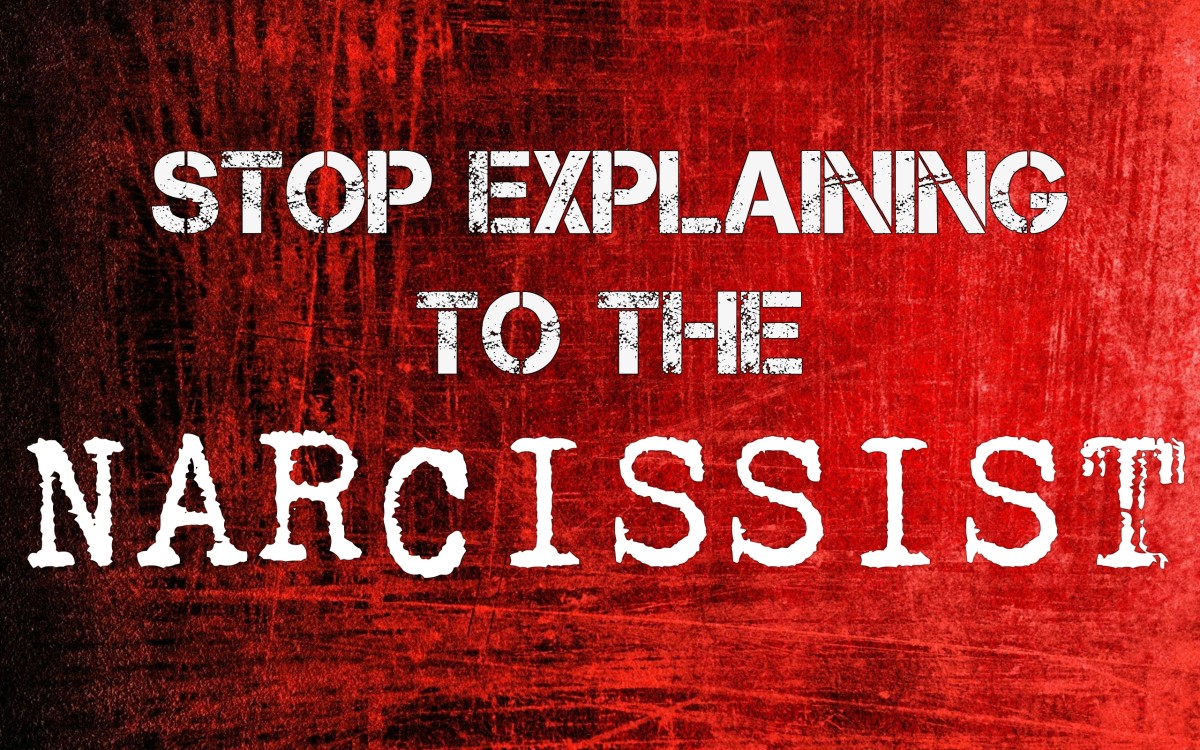
Stop Explaining to the Narcissist! Do This Instead - PairedLife - Relationships
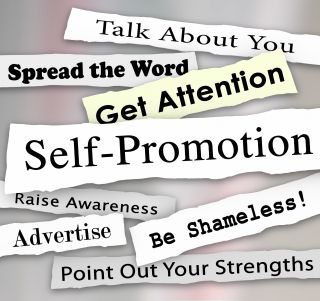
What Is the Most Overlooked Symptom of Narcissism? | Psychology Today

Amazon.com: How to Talk to a Narcissist (9780415958554): Lachkar, Joan Jutta: Books
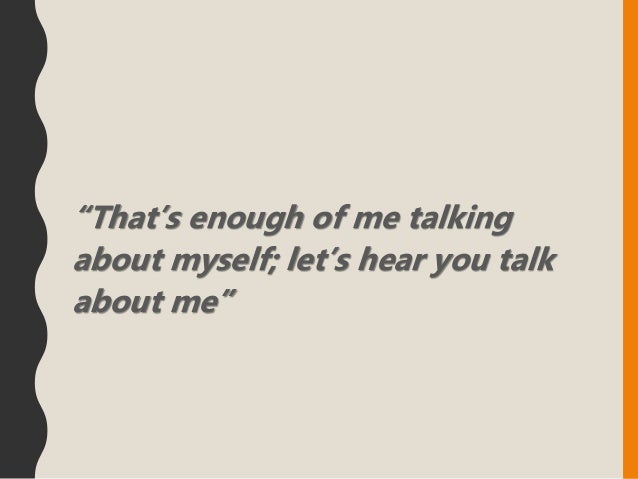
Narcissistic personality disorder

HOW TO TALK TO A NARCISSISTIC HUSBAND AND NOT GO CRAZY (video)

Five Signs of Narcissism

How to talk to a Narcissist by Dan McGill

Exactly How To Deal With A Narcissist So They Can't Hurt You Anymore
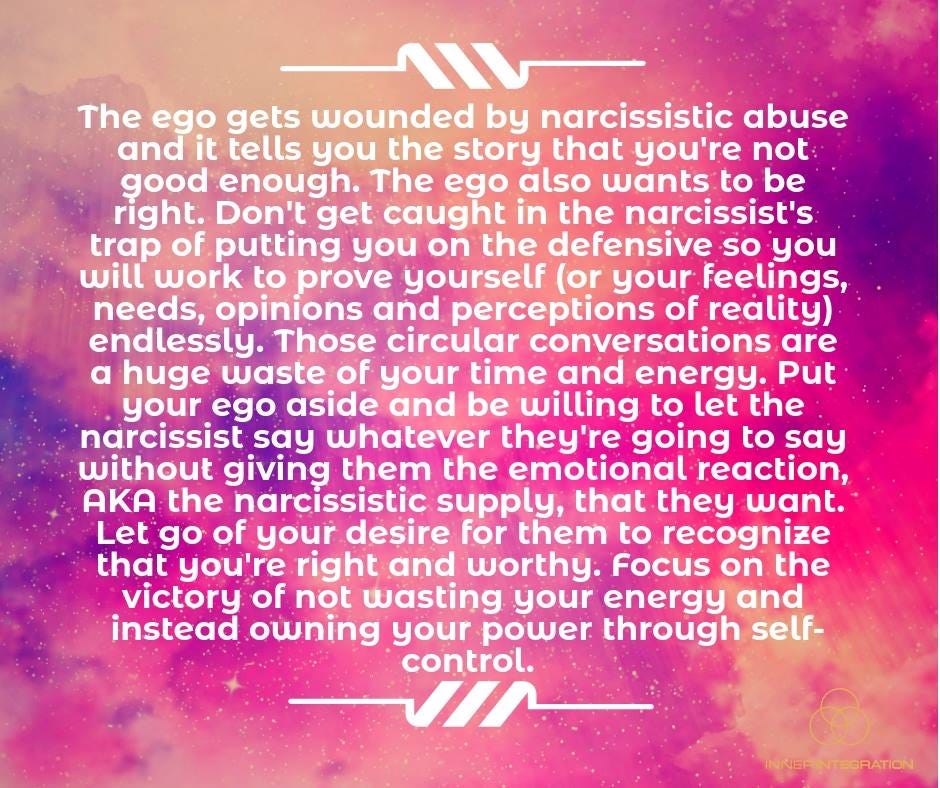
Responding vs. Reacting (Avoid the narcissist's trap + learn a valuable life skill) | by Inner Integration | Medium

Trying To Talk To A Narcissist About Their Bad Behaviour

How to Talk to Someone with NPD (Narcissistic Personality Disorder) | Narcissistic personality disorder, Relationship blogs, Narcissist
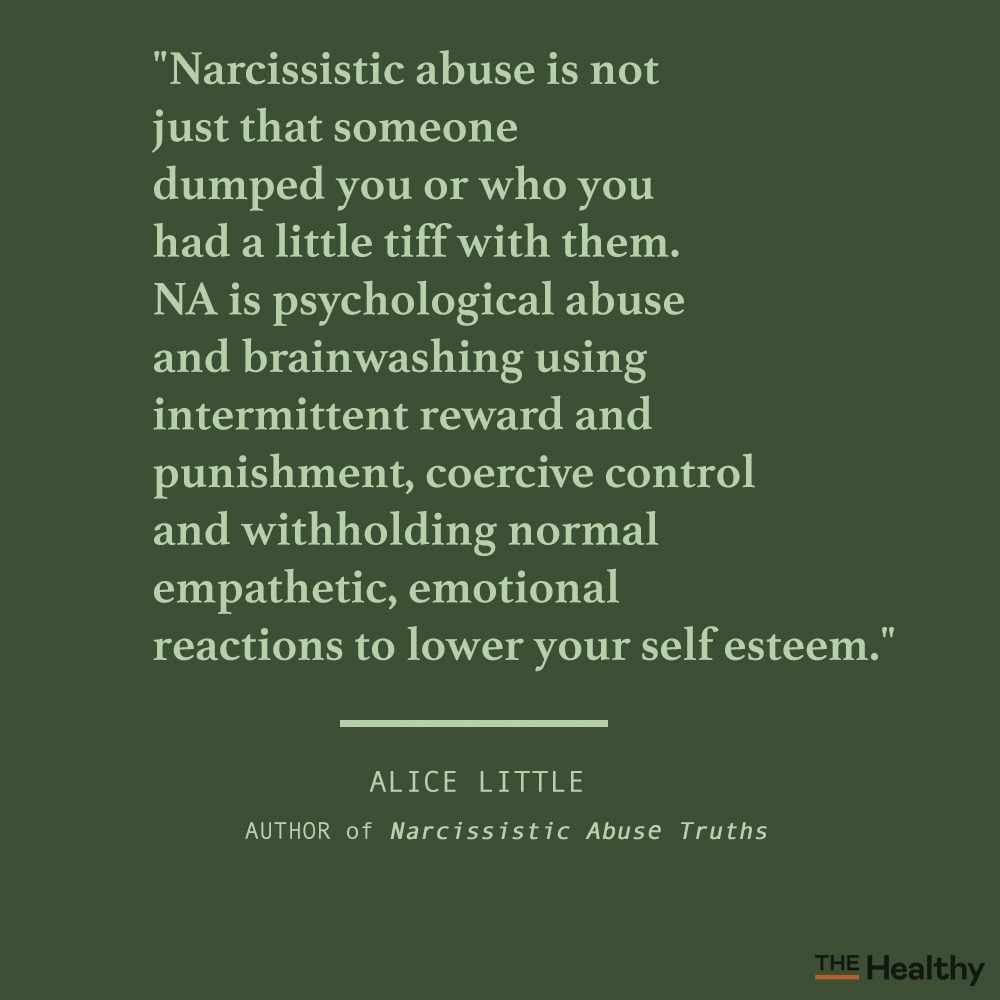
Narcissist Quotes to Deal with the Narcissist in Your Life | The Healthy

Amazon.com: How to Talk to a Narcissist (9780415958554): Lachkar, Joan Jutta: Books
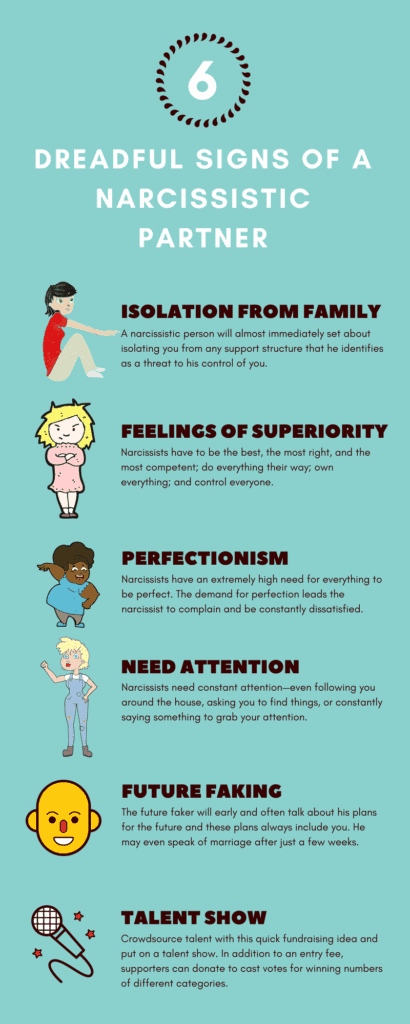
5 Steps To Breakup With A Narcissistic Partner | Power of Positivity

How to Talk to a Narcissist About Being Narcissistic | Psychology Today

I was married to a narcissist for 12 years — and I had NO idea | by Healing From This | Noteworthy - The Journal Blog

How to Get a Narcissist to Leave You Alone 1 Never Tell Them You Are Using Grey Rock 2 Dont Talk to Them Unless You Have to 3 Dont Tell Them ANYTHING
Fear of narcissist retaliation is making me afraid to speak up – The Faces of Narcissism

The Impact of Growing Up With A Narcissistic Parent - The Awareness Centre

How to Talk to a Narcissist
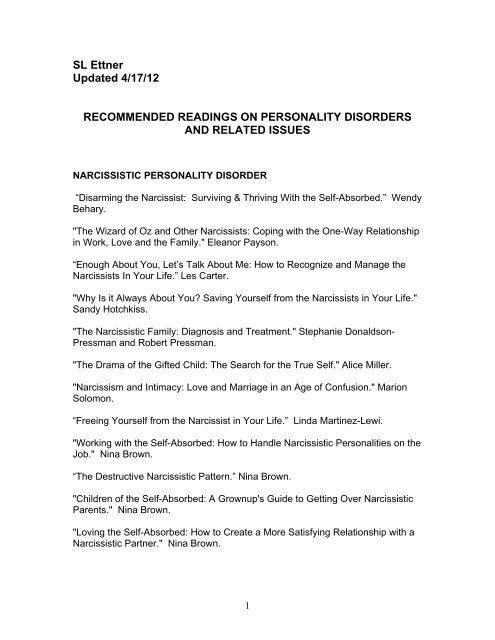
recommended readings on narcissistic personality disorder

How Do You Deal With a Narcissistic friend
Posting Komentar untuk "how to talk to a narcissist"